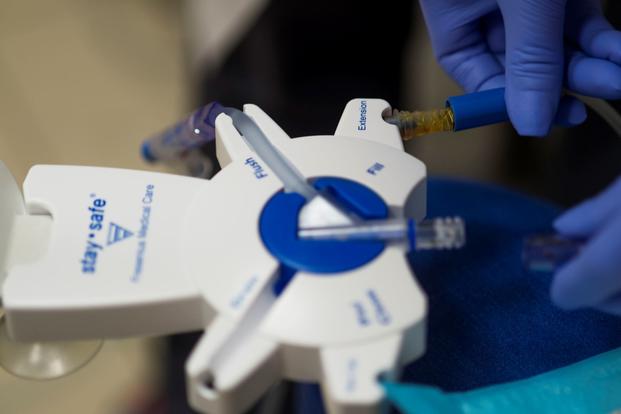Patients with failing kidneys will have more care charges covered at dialysis clinics under a Tricare rule change triggered by the COVID-19 pandemic.
The kidneys of patients with end-stage renal disease, or ESRD, have stopped functioning well enough to keep them alive, necessitating either three-times-weekly dialysis treatments to filter their blood or a kidney transplant.
Until now, Tricare coverage at ESRD facilities paid for patients to receive certain services, such as the dialysis, formally called hemodialysis, itself. However, Tricare hasn’t covered related services typically billed separately, such as nursing care. The new rule, which was effective Jan. 12, permanently extends coverage to those other costs tied to receiving dialysis. The coverage change will not be affected by the ending of the COVID-19 federal public health emergency declaration, due to happen this spring.
Kidney problems are one of the many lingering complications of COVID-19. A study of Department of Veterans Affairs patients found "increased risk of kidney outcomes" when comparing the records of about 89,000 veterans who had survived COVID-19 for at least 30 days past their infection with 1.6 million who hadn't yet had COVID-19. A separate VA study of patients who had been infected with SARS-CoV-2 multiple times found that kidney risk rose after subsequent infections, as did that of other "post-acute sequelae" such as heart disease and strokes.
Tricare already expected patients with ESRD to apply for Medicare coverage, which begins in the fourth month of dialysis. Medicare already pays for the services Tricare is adding.
Peter Graves, a spokesperson for the Defense Health Agency, did not provide information after multiple queries starting Jan. 13 about the volume of Tricare ESRD cases; how much case numbers had changed since the start of the pandemic; nor how many beneficiaries had experienced kidney disease from COVID-19.
Issued by Acting Assistant Secretary of Defense for Health Affairs Seileen Mullen, the interim final rule cites the Omicron variant of the SARS-CoV-2 virus continuing to cause "high levels of severe illness, hospitalization, and death, primarily in the unvaccinated and immunocompromised populations." ESRD patients qualify as immunocompromised.
The rule also says that "the pandemic continues to threaten to strain the health care system" and that "new variants of COVID-19 are expected to occur."
Comments on the coverage rule will be accepted through March 13, 2023, after which it becomes permanent. No negative comments are expected, according to the rule posting. Any delay in implementing the rule would have been "contrary to public interest and public health," the rule posting says.
– Amanda Miller can be reached at amanda.miller@military.com.











